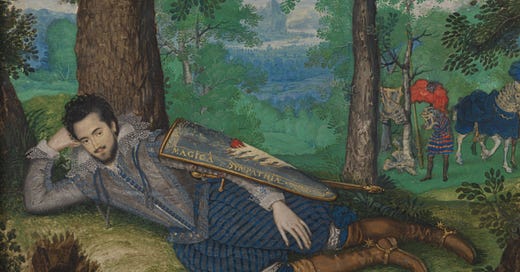In 1608, after nine years of marriage, Edward Herbert, Baron of Cherbury, called his children Beatrice, Florence, and Richard before his wife, Mary, and asked her “how she liked them?” To which she answered, “Well.”
Perhaps that monosyllable, which comes across as curt, even sullen, on the page, reflected a certain amount of trepidation, for Edward had staged this little scene for a reason. He had a proposal to make. Since “for my part, I was but young for a man”—Edward was 26—“and she not old for a woman”—Mary was 30—if either of them were to die and the other were to remarry, they might have additional children. They should each settle an equal amount of money on Richard and any future sons now, Edward suggested, to prevent their children from losing out to future half siblings. By the standards of the day, it was a reasonable proposal, though Edward’s melodramatic way of making it suggests he must have anticipated resistance. If he did, he was right, for Mary was not interested. She would not “draw the cradle upon her head,” she said. That is, she would not renounce her own interests in favor of her children’s, present or future. Edward gave her a few days to think it over, and she departed. She seemed, he reflected, “not very well contented.”
A couple of weeks later, he raised the matter again. Again, he attempted to appeal to her emotions. But this time, he made a threat. He had been too young to go abroad before their marriage, he told her. But he would go now if she refused to guarantee their sons a portion of her estate. Mary replied that he knew her views on that point and she was not prepared to change them. She would be sorry to see him leave, but if he was determined to go, “she could not help it.” It’s easy to hear the edge in Mary’s voice even across the distance of four centuries. Edward was true to his word. He went abroad, leaving her pregnant with their child, another son, Edward Cherbury.
This little episode, told with Herbert of Cherbury’s usual directness, reveals a good deal about the texture of early modern emotional life. It suggests that painful tensions could arise, then as now, at the intersection of marriage and money. It demonstrates that remarriage was just as much on people’s minds in an age of high mortality as it is today, in an era of high divorce rates. And it also shows that the shape of a life mattered deeply to early modern men and women. Youth and age, birth and marriage, death and life expectancy all influenced how they negotiated their relationships and decided their course of action.
From the start, age, family, and money had been intertwined in the Herberts’ marriage. It was age, in fact, that first got me interested in this couple. Edward Herbert, first Baron of Cherbury, was a philosopher, diplomat, minor versifier, major landowner, and the older brother of the great devotional poet George Herbert. In 1599, at the age of 17, his relatives arranged for him to marry a distant relation, Mary Herbert, who was four years his senior at 21. A generation or two earlier, a marriage at 17 wouldn’t have raised eyebrows. Medieval aristocrats, both male and female, often married in their teens to cement family alliances. But by the Elizabethan period, 17 was beginning to seem exceptionally young for an elite young man. In fact, of the 600 writers I examined across the Renaissance, Edward Herbert was the last man to marry below the age of 18. Conveniently for future literary historians, he did so right at the century’s close, in 1599, marking the end of an era. Still, when I saw Herbert’s age at first marriage in my spreadsheet, I figured that there might be an interesting story behind it. And as it turned out, there was.
Like Portia’s father in The Merchant of Venice, Mary Herbert’s father wanted to dictate her choice of spouse from beyond the grave. He left her vast estates on one condition: she had to marry someone with her own last name, Herbert. Otherwise, his considerable fortunes would revert to another branch of the family. At 21, Mary had just come of age. No doubt Edward Herbert’s family wanted to act quickly to secure such a valuable match: after all, Edward was not the only Herbert in England. And no doubt her family felt equal pressure now that Mary had reached the age of majority, which gave her much more control of both her fortune and her person. The result was an exceptionally early marriage for Edward. When he met Queen Elizabeth a year later, she looked at him attentively and remarked, “it is pity he was married so young” (37). Edward himself seems to have felt much the same. When he left for the Continent nine years later, he was, in a sense, making up for his lost youth.





Did Edward and Mary reconnect at some later point? Did he come back?
Really interesting!